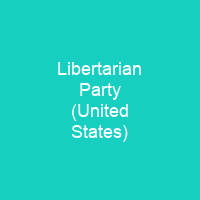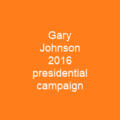The Libertarian Party promotes civil liberties, non-interventionism, laissez-faire capitalism, and limiting the size and scope of government. The party generally promotes a classical liberal platform, in contrast to the Democratic Party’s modern liberalism and progressivism and the Republican Party’s conservatism. It is the third largest political party in the United States by voter registration, and currently has one member in Congress, Representative Justin Amash of Michigan.
About Libertarian Party (United States) in brief
 The Libertarian Party promotes civil liberties, non-interventionism, laissez-faire capitalism, and limiting the size and scope of government. The party generally promotes a classical liberal platform, in contrast to the Democratic Party’s modern liberalism and progressivism and the Republican Party’s conservatism. It is currently the third largest political party in the United States by voter registration, and currently has one member in Congress, Representative Justin Amash of Michigan. There are 609,234 voters registered as Libertarian in the 31 states that report Libertarian registration statistics and Washington, D. C. The 2012 election Libertarian Party presidential candidate, former New Mexico Governor Gary Johnson, received the highest number of votes of any Libertarian presidential candidate at the time. In 1996, the Libertarian Party became the first third party to earn ballot status in all 50 states two presidential elections in a row. In the 2020 United States elections, the Libertarians gained a seat in the Wyoming House of Representatives, giving them their first state legislative win since 2000. As of 2020, there were 211 Libertarians holding elected office: 89 of them partisan offices and 122 of them non-partisan offices. The first electoral vote for a woman was that for Tonie Nathan of the party for Vice President in the 1972 United States presidential election due to a faithless elector supporter who eschewed his expected vote for Richard Nixon. In 1994, over 40 Libertarians were elected or appointed which was a record for the party at that time. The Libertarian Party has had significant electoral success in the context of state legislatures and other local offices.
The Libertarian Party promotes civil liberties, non-interventionism, laissez-faire capitalism, and limiting the size and scope of government. The party generally promotes a classical liberal platform, in contrast to the Democratic Party’s modern liberalism and progressivism and the Republican Party’s conservatism. It is currently the third largest political party in the United States by voter registration, and currently has one member in Congress, Representative Justin Amash of Michigan. There are 609,234 voters registered as Libertarian in the 31 states that report Libertarian registration statistics and Washington, D. C. The 2012 election Libertarian Party presidential candidate, former New Mexico Governor Gary Johnson, received the highest number of votes of any Libertarian presidential candidate at the time. In 1996, the Libertarian Party became the first third party to earn ballot status in all 50 states two presidential elections in a row. In the 2020 United States elections, the Libertarians gained a seat in the Wyoming House of Representatives, giving them their first state legislative win since 2000. As of 2020, there were 211 Libertarians holding elected office: 89 of them partisan offices and 122 of them non-partisan offices. The first electoral vote for a woman was that for Tonie Nathan of the party for Vice President in the 1972 United States presidential election due to a faithless elector supporter who eschewed his expected vote for Richard Nixon. In 1994, over 40 Libertarians were elected or appointed which was a record for the party at that time. The Libertarian Party has had significant electoral success in the context of state legislatures and other local offices.
In July 2016, four state legislators from four different states left the libertarian party to join the GOP. In May 2016, Utah Senator Mark B. Madsen and New Hampshire Representative Max Abramson did not run for re-election to their respective offices while John Ebke was not re-elected for the Nevada Assembly. In June 2017, Nevada Senator Laura Ebke officially censured his party over his support of taxpayer stadium funding for the 2018 Republican National Convention. In the 2016 election cycle, four Republican state legislators lost their races after the GOP censured them over their support of the taxpayer stadium. John Moore lost his race for Nevada Assembly in January 2016 and was not allowed to run for reelection in May 2016. In January 2017, Nebraska Senator Laura. Ebke and New. Hampshire. Representative Max. Abramson were expelled from the GOP for not supporting same-sex marriage in the 2012 election cycle. Rhode Island State. Representative Daniel P. Gordon was expelled in 2011 and joined the Libertarian party in 2011. In 2000, Steveillancourt won election to the New Hampshire General Court running on the Libertarian and Republican lines. Neil Randall, a Libertarian, won the election to Vermont House of House in 1998 running on both the libertarian and GOP lines. In 1998, Neil Randall won the race to the Vermont General Court in 2000, running on Libertarian and GOP Lines. Neil Randall was the first Libertarian to be elected to a state legislature in New Hampshire.
You want to know more about Libertarian Party (United States)?
This page is based on the article Libertarian Party (United States) published in Wikipedia (as of Dec. 14, 2020) and was automatically summarized using artificial intelligence.







